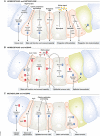Ageing, metabolism and the intestine
- PMID: 32567155
- PMCID: PMC7332987
- DOI: 10.15252/embr.202050047
Ageing, metabolism and the intestine
Abstract
The intestinal epithelium serves as a dynamic barrier to the environment and integrates a variety of signals, including those from metabolites, commensal microbiota, immune responses and stressors upon ageing. The intestine is constantly challenged and requires a high renewal rate to replace damaged cells in order to maintain its barrier function. Essential for its renewal capacity are intestinal stem cells, which constantly give rise to progenitor cells that differentiate into the multiple cell types present in the epithelium. Here, we review the current state of research of how metabolism and ageing control intestinal stem cell function and epithelial homeostasis. We focus on recent insights gained from model organisms that indicate how changes in metabolic signalling during ageing are a major driver for the loss of stem cell plasticity and epithelial homeostasis, ultimately affecting the resilience of an organism and limiting its lifespan. We compare findings made in mouse and Drosophila and discuss differences and commonalities in the underlying signalling pathways and mechanisms in the context of ageing.
Keywords: ageing; epithelial barriers; intestinal homeostasis; metabolism; stem cells.
© 2020 The Authors. Published under the terms of the CC BY 4.0 license.
Conflict of interest statement
The authors declare that they have no conflict of interest.
Figures





References
-
- Aitman TJ, Boone C, Churchill GA, Hengartner MO, Mackay TFC, Stemple DL (2011) The future of model organisms in human disease research. Nat Rev Genet 12: 575–582 - PubMed
-
- Almousa AA, Meurens F, Krol ES, Alcorn J (2018) Linoorbitides and enterolactone mitigate inflammation‐induced oxidative stress and loss of intestinal epithelial barrier integrity. Int Immunopharmacol 64: 42–51 - PubMed
Publication types
MeSH terms
Grants and funding
LinkOut - more resources
Full Text Sources
Molecular Biology Databases

